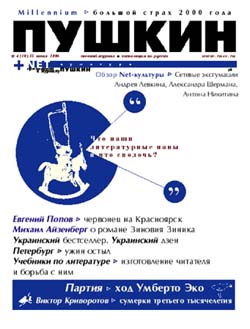
PUSHKIN #10. SUMMARY
The issue commences with Yevgenii Popov's lyrical description of the city of Krasnoyarsk as seen on a ten rouble bank-note. The reality of monetary signs opens onto political reality with Alexander Lebed becoming the ruler of the Krasnoyarsky region.
Ivan Zasursky's article is devoted to the recently created "Committee 2.000". The aim of the Committee is to unite Russian intellectuals on a new basis at a time when they are dissociated and torn apart by various financial groups subsidizing their efforts. The author holds that democracy finds its true resources in the knowing few.
The reader is allowed an exclusive glimpse into the creative world of Umberto Eco - writer, semiotician, critic. An excerpt from Eco's new unpublished novel "Isle on the Eve" is accompanied with Alexei Zverev's comments and notes. Dmitrii Novikov not only draws a portrait of Eco, but presents a lengthy conversation with the latter during his recent stay in Moscow. Answering the questions of his Moscow interlocutors Eco reveals his philosophical presuppositions, his experience as scholar, writer, cinema critic, giving a lively and vivid picture of contemporary Western culture.
Mark Pechersky reviews Richard Taruskin's "Defining Russia Musically" being overtly impressed by the study and considering it an important contribution to the understanding of Russian culture.
The section "Not Far from Moscow" unites three texts. Victor Krivulin discusses the pronounced fashion for monuments in St.Petersburg, noting, however, that there is not much originality in the new erections, Alexander Privalov compares literary events in Moscow and those in St.Petersburg giving preference to the former, and Valery Shubinsky in analyzing the reception of poetry today thinks that there are more resources in the poetry of the past, particularly in that of Aronzon and Yuryev, than in the properly "avant-gardist" trends.
In examining the role of literature on the "Freedom" radio station Victor Toporov expands on the role of radio-publications in the lives of such writers as Dovlatov and Kabakov. Characterizing the present state of "Freedom", the author suggests that it is preoccupied solely with Russian literature, which after all is not bad. Andrei Novikov traces the emergence of glossy magazines recalling his own collaboration in the mid 90s with the magazine "Obozrevatel". He is inclined to call the new type of journalistic writing "plastic".
Marking the 200th anniversary of Ukranian literature, Anna Brazhkina speaks of the healthy and reassuring tendencies in today's belles-lettres, particularly praising the best-selling writings of Oksana Zabuzhko and Yurii Andrukhovich. Alexander Lyusyi focuses his attention on another trend in modern Ukranian writing - its terroristic aspect as exemplified in the works of Dmitrii Korchinsky.
Ivan Davydov reviews the textbooks by N.D.Tamarchenko and L.Ye.Streltsova based on new principles of teaching literature at school. Thanks to the authors' efforts literature stops being an illustration to other disciplines and becomes a subject in its own right.
In reviewing Zinovii Zinik's recently published "Encounters with the Original" Mikhail Aizenberg finds the contours of a certain generation imprinted on its pages. In his account of the Russian translation of Francois Gibault's "Interdit aux Chinois et aux chiens" Cyril Medvedev together with the author concentrates on the principles and the dangerous attraction of writing memoirs. Alexei Penzin presents his version of J.-P.Sartre's "Idiot of the Family" suggesting the philosopher's totalizing approach to the life and work of Flaubert.
Analyzing the phenomenon of Alexander Dugin, the notorious national bolshevik, Sergei Ryutin traces his evolution throughout the 90s: even if he did have some analytical potential in the beginning when bringing forth controversial issues, he has now become more of a literary character in the public mind. Denis Dragunsky lucidly shows that if there is any danger at all threatening Russia at present it comes from (within) Russia itself.
The "Millennium" section opens with Victor Krivorotov's study of the waves of history and particularly of the "third wave" of twilight that is bound to follow our own time. The author's vision of the future is fairly pessimistic, the more so as any class society is characterized by a stable pattern of an unequal distribution of resources. The material is followed by a sociological survey shedding light on the current political sentiments and expectations in Russia. In his recognizably grotesque manner Igor Yarkevich writes about the fear of simple things, thus ironically sketching our basic phobias.
Vyacheslav Glazychev comments on the PORTFELIO project launched by the Club of Designers. He gives a professional assessment of its plans and ideas.
The issue traditionally comprises a separate "Net-Culture" section. The reader will find texts by such net "practitioners" and experts as Anton Nosik, Leonid Delitsyn, Andrei Lyovkin and Alexander Sherman, focusing primarily on net censorship in the Ukraine and on advertizing. Irina Durova tells the story of her strange encounter with the "real" author of Pushkin's secret notes attributed to the computer celebrity Armalinsky. Alexei Andreyev, Anton Nikitin and Maxim Smolev each in his own specific manner develop the subject matter of "literature" (representation) in the Internet.
|

